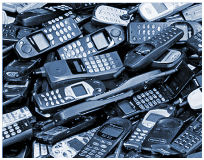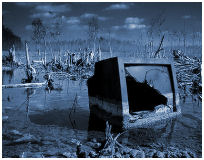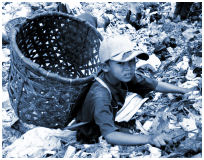Waste-based economy

Accessories, spare parts, maintenance: three pillars of our economy, three significant sources of waste and garbage.
Accessories are a huge business. Every time a company is delivering a new product or even a new model of a certain product, several accessories become obsolete. The old ones simply do not fit the new product. An example? Many enterprises periodically change all mobile phones provided to employees for business purposes. In the last ten years, for instance, my company changed phones at least four times. They were all Nokia phones, so you may expect most accessories could be reused, but this was not the case. We had to change headsets, chargers, connection cables, and all the employees who purchased additional accessories had to change them as well. All working stuff. Furthermore the new plug and socket types were not necessary from a technological point of view, that is, they did not provide a significant added value.
According to a recent study from ABI Research, 66% of revenues earned from mobile phone accessories are generated in the aftermarket. In fact, on the retail shelf a mobile phone accessory is a high-margin product that will generate actual income. Anyway, most of those accessories may become useless before the product dies, that is, the commercial life of a product is usually shorter than the technological life, and such a gap is intentional. This is called “planned obsolescence”.
Another example? Windscreen wipers. Even in such a case there is an unreasonable wide range of articulated joints that make each wiper incompatible with the others, even among different models of the same car, but in such a case we have an additional waste: in most cases, when the rubber blade is worn or broken you have to change the whole blade. It is more and more difficult to find wiper refills in stores. A blade is made of a lot of metal parts which have a cost and require a certain amount of work to be assembled. Throwing away the whole blade just because the rubber strip is damaged is simply an unacceptable waste.

We could make a lot of other examples. From November 16th to 30th, Latium is moving to Digital Terrestrial Television. This is a mandatory change, that is, since November 30th, 2009 Latium residents have to buy a decoder or to purchase a new DTT-enabled television in order to watch the tube in their region. In most cases all VCRs and other devices that are connected to televisions will become obsolete too. So, in the last two weeks a huge amount of devices have been dumped. Working devices, not broken ones.
This is true also in case of maintenance. If you call someone to repair an appliance, in many cases he will change a big component even if the problem is related to a small one. We throw away a lot of working stuff just because it is simpler to substitute the whole part than a specific component. Of course, makers say that it is faster to change everything rather than spending time to identify the problem, but this is also due to the way the appliance is designed.
Last but not least, packaging. A lot of products are sold in colorful large boxes because it gives you the impression that you are purchasing a “great product”. In most of cases the wasted room is not necessary to protect the product. It is simply wasted room. So your product will cost more because the box is bigger and you can fit less boxes in one truck. Trucks carry just air. Boxed air. Colorful boxed air.

So on the short term waste is surely a business, but on the long one is a suicide. We are wasting a lot of resources because we are rich, and we are rich because most of people in the world is poor. If every individual in world wasted resources as we do, we would need seven planets to sustain our economy. But most of people in the world has serious problems to survive and that allow us to continue to base our economy on waste. We simply do not care. Each of us. It is not only a fault of companies and governments, but of each of us.
Changing is not so hard. We should only work on standards and design, that is, we should establish rules about how products have to be designed. We already used that approach for electrical plugs and sockets, PC cards, screws, and a lot of other components. Of course we have to define flexible rules, since we do not want to curb innovation and technological development. If a change is requested to provide a useful function, then that change should be allowed. But if there is not a valuable reason, all the companies should be compliant to the same standards. We cannot play anymore with the resources of our planet. I am sorry for the ones who became rich because of a waste-based economy, but it is really time to change!




















Si prega di usare Facebook solo per commenti brevi.
Per commenti più lunghi è preferibile utilizzare l'area di testo in fondo alla pagina.
Commenti Facebook